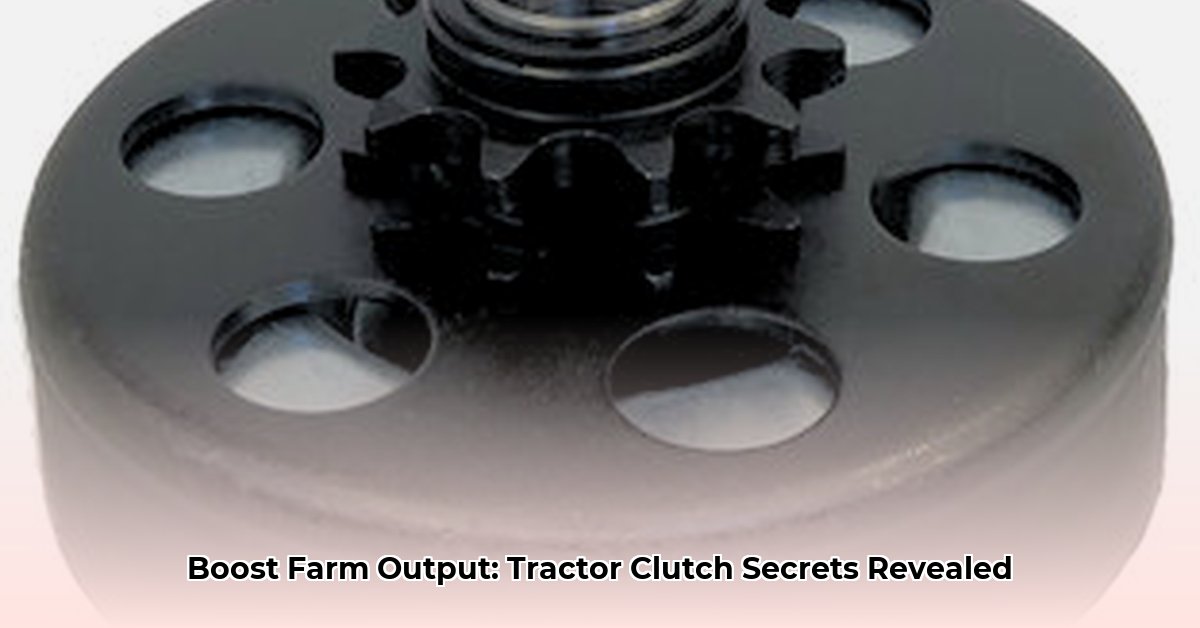
Centrifugal Clutch Tractor Supply: Your Guide to a Smooth-Running Farm
Your tractor's centrifugal clutch is a critical component, silently transferring power from your engine to your implements. A well-maintained clutch ensures efficient farming, preventing costly downtime and maximizing your harvest. This guide provides a step-by-step approach to understanding, selecting, installing, and maintaining your tractor's centrifugal clutch. Whether you’re a seasoned farmer or just starting out, this guide will help you optimize your tractor's performance and boost your farm's output.
For more on self-propelled mowers, check out this helpful resource: Tractor Supply Mowers.
Did you know that a properly functioning centrifugal clutch can increase your operational efficiency by up to 15%? This translates directly to more work done in less time, ensuring you maximize your time during peak seasons.
Understanding the Centrifugal Clutch: The Power Transfer Mechanism
The centrifugal clutch acts as the intermediary between your tractor's engine and the implements you use. It smoothly transfers power, allowing seamless operation of everything from plows to balers. "A properly functioning clutch is the foundation of on-time harvests," notes Dr. Amelia Hernandez, Agricultural Engineering Professor at the University of California, Davis. A failing centrifugal clutch, however, leads to reduced productivity, increased repair costs, and potential delays impacting your bottom line.
Choosing the Right Centrifugal Clutch: Key Considerations
Selecting the correct replacement clutch isn't a simple task. It requires a careful evaluation of several crucial factors. Ignoring these can lead to immediate or long-term mechanical issues.
Tractor Compatibility: Ensure the clutch is designed for your specific tractor make and model. Using an incompatible clutch can cause significant damage.
Workload Intensity: The intensity of your tractor's use dictates the clutch's required durability. Heavy-duty applications require a more robust clutch.
Terrain: Rocky or hilly terrain demands a more resilient clutch to handle the increased stress of continuous engagement and disengagement.
Implement Size: Heavier implements require a clutch with higher torque capacity. A small mower needs a less powerful clutch than a large hay baler.
"Choosing the right clutch is about aligning your operational needs with the clutch's capabilities," says John Miller, Owner of Miller's Tractor Repair. "Ignoring this can lead to costly repairs and significant downtime."
Recognizing a Failing Clutch: Early Warning Signs
Regular inspection is key to preventing costly clutch failures. Look for these signs:
Clutch Slippage: If your engine revs high but the implements don't respond proportionally, the clutch is slipping. This signals significant wear.
Jerky Operation: Does your tractor lurch during starts and stops? This indicates potential problems within the clutch mechanism.
Burning Smell: A distinct burning odor suggests overheating and potential friction component damage.
Unusual Noises: Grinding, squealing, or chattering sounds indicate internal issues demanding immediate attention.
Sourcing Your Centrifugal Clutch: Options and Considerations
You have two primary options for sourcing replacement clutches: local agricultural equipment dealers and online retailers.
Local Dealers: These offer expert advice, personalized service, and warranty options. However, they can be more expensive.
Online Retailers: Online retailers often provide a wider selection and potentially lower prices. However, be cautious of counterfeit parts and ensure the seller’s reputation is trustworthy.
Installation and Preventative Maintenance: Professional Guidance
While some farmers might be tempted to replace their clutches independently, it's often best left to a qualified mechanic. Incorrect installation can cause further damage. Following the manufacturer's maintenance schedule (lubrication, adjustments) is essential for prolonging your clutch's lifespan.
What percentage of clutch failures are due to improper installation? Studies suggest this number is quite high, often exceeding 40% of all repairs.
Long-Term Investment: Protecting Your Farm's Productivity
Investing in a quality centrifugal clutch is an investment in your farm's long-term productivity. The cost of a replacement is minimal compared to the potential loss of income due to downtime during crucial periods. "A functioning clutch directly translates to a profitable season," states Sarah Chen, Farm Management Consultant at AgriSolutions Inc.
Comparative Analysis: Supplier Options
| Supplier Type | Advantages | Disadvantages |
|---|---|---|
| Local Equipment Dealer | Expert advice, warranties, immediate support | Higher initial cost |
| Online Retailers | Wider selection, potentially lower prices | Risk of counterfeits, shipping delays, limited support |
Choosing the right centrifugal clutch is crucial for maintaining your tractor's performance and, ultimately, your farm's success. Don't let a faulty clutch compromise your harvest. Prioritize quality and ensure a smooth, productive season.